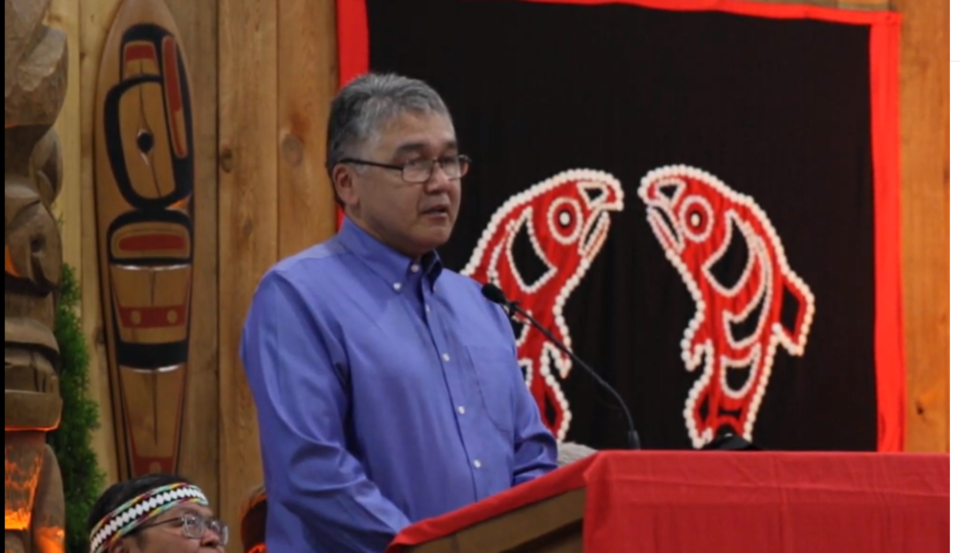The Lil’wat Nation, Village of Pemberton (VOP), Samahquam and the Squamish-Lillooet Regional District (SLRD) came together to strengthen their relationships and find a way forward at the fourth Nuk̓w7ántwal̓ Regional Gathering on May 24.
The regional gathering funded by the UBCM Community to Community Program gave participants an opportunity to foster mutual understanding and to explore the theme "Nuk̓w7ántwal̓ wi ku st̓ákmenlhkalh," which translates to "we help each other to find the way.” Additional funding and in-kind support was provided by the Líĺwat Nation, SLRD, and VOP.
The gathering in May was held at Líľwat Tsitcw (Líĺwat House), Klháka7min--the former site of the Coast Mountain Outdoor School. The 98-hectare site was returned to Líl̓wat Nation by School District No. 48 in a historic agreement in 2022.
The land was once home to a Líĺwat village prior to colonization, and holds significant cultural value to the Líl̓wat7úl. The Nation now hopes to develop it into a place for wellness and healing.
The agenda was facilitated by Gwen Bridge, a member of the Saddle Lake Cree Nation. Bridge is an expert in supporting improved dialogue and relationships between Indigenous and non-Indigenous people and organizations. In small groups, attendees delved into Lil’wat culture and history, the truths of colonization and its enduring legacies, the Indian Act, United Nations Declaration on the Rights of Indigenous Peoples (UNDRIP), Indigenous rights, and ongoing steps toward justice, reconciliation, and healing.
The Nuk̓w7ántwal̓ Intergovernmental Relations Committee will continue to meet quarterly and hopes to organize another Regional Gathering next year. A "What Was Said" Report (WWSR) captured the essential themes and commitments discussed at the Gathering.
Several key themes emerged from the meaningful discussions and will shape how local leaders move forward. At its Tuesday, Sept. 10 council meeting, the VOP discussed the main takeaways from the insightful gathering and presented the WWSR. The report will also be presented to the SLRD on Sept. 25.
Storytelling was prominently recognized as a cornerstone of Indigenous culture, governance, and law. Participants emphasized it serves as a powerful tool for education, decision-making, and the transmission of knowledge to future generations.
Discussions highlighted the critical need to integrate Indigenous narratives into public decision-making processes, ensuring traditional knowledge continues to inform and guide governance practices. The impact of intergenerational trauma within Indigenous communities was also discussed among the groups. Participants stressed the importance of understanding this trauma as a foundational step in building stronger, more empathetic relationships. Healing practices deeply connected to the land were recognized as vital in addressing these deeply rooted issues.
People at the gathering spoke about the importance of including the next generation in conversations about reconciliation and community building. Educating the younger generation was deemed essential for fostering long-term positive change.
Chief of the Lil’wat Nation, Dean Nelson, said the gathering was an opportunity to share his thoughts on the Nation’s history to those who were willing to listen.
“The history of the Líl̓wat and the impacts of colonialism from inception to present must be known by all if we wish to carry on,” he said in a release. “We must continue to work toward justice for First Nations people and to increase understanding from the general public. We all must understand the long-term negative impacts of Residential School, we must truly come to terms of the specific intention of the applied Indian Act and reserve systems. We need to carry on undoing the impacts and take steps in removal of the destructive processes.”
Nelson said they need to carry on the conversations and seek a clearer path of reconciliation to figure out how to move forward.
Pemberton Mayor Mike Richman said the gathering allowed participants to reaffirm their commitment to collaboration and explore ways to support one another.
“Gwen Bridge's exceptional facilitation helped us to focus deeply on relationship-building and envisioning a more connected and harmonious future for all our communities,” he said in the release. “Holding the gathering at a site rich with cultural significance and historical connections added profound meaning to our discussions. As we walked the land, shared stories, and learned about its healing properties, we were reminded of the importance of understanding, compassion, and equity in our ongoing journey together. The commitment expressed by all participants to focus on the collective well-being of the Valley marks a significant step forward."
SLRD Board Chair Jen Ford thanked the Chiefs and Council of Líĺwat Nation for welcoming them to Klháka7min. She reflected on a “meaningful” day on land that has been returned to the Líĺwat Nation.
“We had an opportunity to learn more about Líĺwat history and culture and speak from the heart about our relationship and how we can better support one another,” she said in the release. “I am humbled to be involved in this work and especially as we strive toward implementation of the United Nations Declaration on the Rights of Indigenous Peoples. Each of us as individuals, and through our organizations, has a role to play in building these relationships and understanding what truth and reconciliation looks like and how we can all move forward together.”




